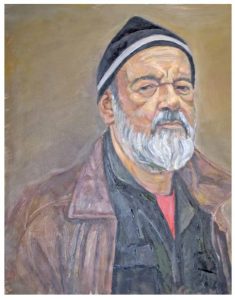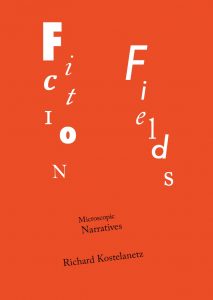FictionFields: Microscopic Narratives
by Richard Kostelanetz
7 x 10 in. Deluxe paper edition $18.95; 120 pages
ISBN: 978-0-9975051-1-5
For information or questions about shipping, please see our contact page.
Individual entries on Richard Kostelanetz’s work in several fields appear in various editions of Wikipedia.
NNDB.com
Britannica.com
Postmodern Fiction
Contemporary Poets
Who’s Who in America
Contemporary Novelists
Who’s Who in the World
Who’s Who in American Art
Directory of American Scholars
Advocates for Self-Government
Readers Guide to Twentieth-Century Writers
Baker’s Biographical Dictionary of Musicians
Who’s Who in U.S. Writers, Editors, and Poets
The Merriam-Webster Encyclopedia of Literature
The Facts on File Companion to American Poetry
The Facts on File Companion to 20th Century Poetry
Contemporary Jewish-American Dramatists and Poets
The Chronology of Webster’s Dictionary of American Writers
The HarperCollins Reader’s Encyclopedia of American Literature
The Greenwood Encyclopedia of Multiethnic American Literature
The Greenwood Encyclopedia of American Poets and Poetry

About experiences that happened I write essays; my fictions portray what hasn’t happened.
For decades now I’ve wanted to write the shortest narratives anyone has ever written. Though the words here might be common, the frame in which they appear is not, the frame thereby bestowing conceptional resonances the words wouldn’t otherwise have. One measure of fiction is the suggestion of duration. Within three words or less I’ve tried to suggest beginning, middle, and end.
Every effort was made to exclude all those previously appearing in my Minimal Fictions (1994) and Micro Fictions (2010).
—Richard Kostelanetz,
During the 1960s, painters and sculptors continued to exclude subject matter and soar away into purer and purer realms of logical fantasy, intellectual elaborations based almost exclusively on logic and reason, mathematics and geometry. It used numbers to organize; it excluded motion and symbolism, turning instead to arithmetical series, algebraic compounds, and modular arrangements in almost mystical proportions. The appeal was to the mind, to engage the intellect alone.
—C. Ray Smith, Supermannerism (1977)
Literature is a combinatorial game that pursues the possibilities implicit in its own material, independent of the personality of the poet. But it is a game that at a certain point is invested with an unexpected meaning, a meaning found not on the linguistic plane on which we were working, but slipped in from another level, activating something that is of great concern to the author or his society.
—Italo Calvino, Readers, Writers and Literary Machines (1967)
